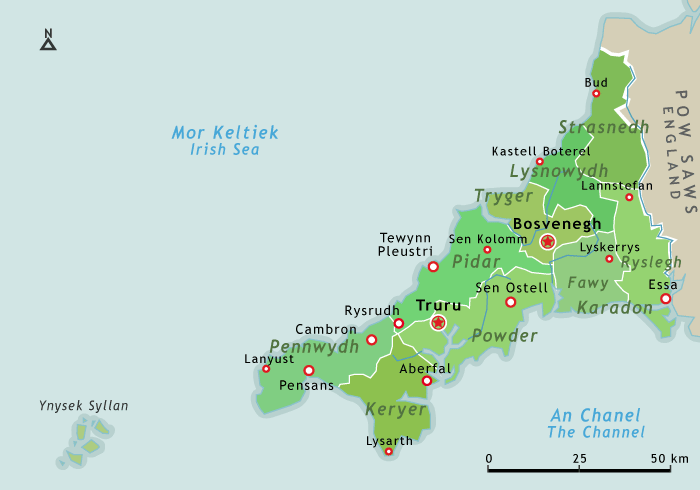Cornwall, a small-scale rebirth

Cornwall is one of the six Celtic nations and is the second-smallest Celtic language community after the Isle of Man. Its residents do not have the same recognition as the other people of the United Kingdom and they have yet to meet the challenge to resurrect their language.

The Cornish flag is made up of a white cross on a black background. Called “St Piran” or Gwynn ha du (white and black), by analogy with the Breton flag Gwenn ha du, it was originally the banner of St Piran, an Irish monk who visited Cornwall in the 6th century. Legend has it that he adopted these colours after seeing a tin plate decorated with a white cross on a black background.
For this reason, contrary to Wales and Scotland, they do not benefit from external recognition of their own identity. According to results published by the Morgan Stanley Institute in 2004, 44% of people questioned in Cornwall consider Cornwall to be English. The daily language is English, and Cornish rarely benefits from an equal status.
Considered a “dead” language, it has however become the daily language of more than a thousand people. This rebirth is an achievement that singles out this small population of Europe.
The name Cornwall comes from the Anglo-Saxon term Cornu-Wealha, literally signifying “Cornish-Welsh”. The name Kernow, a Cornish term used to describe the Cornish people, is descended directly from the Cornovii people. Other sources say that Corineus, a Trojan warrior of the army of Brutus of Brittany, had left his name to the country.
For a long time, the exploitation of minerals and fishing has been two symbolic activities of Cornwall.
Today, as the Cornish language is protected by the government of the United Kingdom, the Cornish people continue to reclaim greater autonomy and demand to be considered as a nation of the kingdom. Controversy also surrounds the constitutional status of Cornwall: officially a “county”, should it regain its status as Duchy, as considered by many Cornish people?

Identity card

| Name | Kernow | Cornish Cornwall | English |
| Population | 568,210 inhab. (2018) |
| Area | 3,563 km² |
| Languages | Kernewek | Cornish (without official status) English | English (state official) |
| Number of native speakers | 550 | Cornish |
| State of guardianship | United Kingdom |
| Official status | County of the United Kingdom |
| Capital | Truru | Cornish Truro | English |
| Historic religion | Methodist Christian and Anglican |
| Flag | Gwynn ha du / An Banner Sen Pyran |Cornish (White and black / the banner of St Pyran) |
| Anthem | Bro Goth Agan Tasow | Cornish (Old Land of My Fathers) |
| Motto | Onen hag oll | Cornish (One and all) |

Timeline

- 936 • Athelstan, king of England, expels the Cornish people of Exeter and establishes the border between England and Cornwall to the east of the river Tamar.
- 1337 • Cornwall becomes a Duchy.
- 1497 • Reacting to taxes imposed by King Henry, Michael Joseph (An Gof), blacksmith by profession, leads a revolt by the Cornish people.
- 1549 • Cornish rebellion against the Prayer Book in English.
- 1702 • Welshman Eduard Lhuyd studies Cornish and notes similarities with other Celtic languages.
- 1904 • Henry Jenner publishes his Handbook of the Cornish Language. Creation of the Pan-Celtic Congress.
- 1955 • Le Mebyon Kernow is founded.
- 2001 • Petition of 50,000 signatures to demand a Cornish assembly equivalent to that of Wales.

Brief history

Violent rebellions were organised in Cornwall in 1497. As a result, these uprisings affected Cornish identity and language. They illustrate perfectly the difficult relations between the centre and the periphery. The popular uprising of 1497 saw the Cornish people protest against increased taxation, which had been introduced to finance the wars of Henry VII of England. This occurred despite the Cornish Stannary Parliament obtaining advantageous rights. Hoping to overthrow the king’s power, Perkin Warbeck made a deal with the Cornish people in the same year, who had staged the uprising only three months earlier. Leading an army and promising to end exorbitant taxes if he took power, Warbeck obtained the support of the Cornish people. Defeated, he abandoned his army. Many Cornish people perished during this episode.

Geography

Cornwall is a very isolated area to the south-west of Great Britain. In fact, surrounded by the sea to the north, west and south, it finds itself cut off from the United Kingdom by the river Tamar. Thus, it forms a peninsula and is strongly exposed to the dominant winds of the Atlantic Ocean. The shoreline consists of cliffs dotted with sharm rias (or estuaries) and types of small fjords. St Austell (S. Ostell) is the principal town with more than 30,000 inhabitants. The extraction of kaolin (clay) is one of the most important in Europe.



Language

Kernewek
The Cornish language is a language closely related to Breton and Welsh through its affiliation with Celtic languages of the Brythonic branch. Indeed, it is more removed than other Celtic languages of the Goidelic branch (Irish Gaelic and Scottish Gaelic and Manx). The Cornish people share around 80% of their vocabulary with Breton and 75% with Welsh. Until the end of the 18th century and probably the beginning of the 19th century, Cornish was a language of daily communication. Today, the number of native speakers is very small (a few thousand of neo-native speakers) but the language is in constant growth, and Cornish is again becoming the daily language of many speakers.

Politics now

Cornwall is considered as a ceremonial county of England by the British administration. According to the Constitution it is a royal Duchy of the United Kingdom. The political life of Cornwall is dominated by the Central Democrat Party (centre-left), which responds in various ways to questions of decentralisation, the Cornish language and the status of Cornwall. The lone autonomist party, the Mebyon Kernow, currently has a few representatives at most district councils and in certain municipalities.
Representative parties of Cornwall
- Mebyon Kernow / Sons of Cornwall (MK) (Social Democrat)

